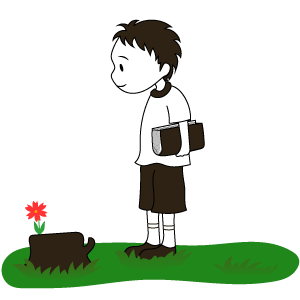When you hear the words “world history,” you probably think of the world history textbooks or reference books that you learn in school. I remember not a textbook, but a manga series called “History of the World” that was published by Shogakukan.
When I was in elementary school, my parents prohibited me from reading manga as a rule, so this was the only exception I was allowed to read (and also the What’s the secret series). I was starved for manga on a daily basis, and I remember devouring them.
Even now, when I think of historical figures such as Cleopatra or Napoleon, I usually use the drawings from this manga as the basis for my image (they are also on the line stamps). Perhaps it is because I read this comic repeatedly that I did so well in history at school.
It is said that people become more fond of history as they get older. Perhaps it is because as we see the future of our lives, we want to place ourselves in the flow of time from the past.
When I read history books, I feel that it is an accumulation of human lives and deaths. And I know that I will eventually be counted as one of those countless people. And I suddenly think, “What is my existence? What is my existence?
But unfortunately, no one can answer this question. When I read history books, I become strangely philosophical. At the same time, I am made aware of the foolishness of human beings.
Sometimes, I read a book titled “The World History of War: A Compendium” (Kawade Shobo Shinsha), and just by flipping through it a little, I get a gloomy feeling that the history of mankind is indeed history, and that wars may never cease to exist in the future.
We tend to think of the first and second world wars as the greatest mistakes of mankind, but if you just read the history of Greece in BC, you will see that people have just been doing the same thing over and over again. But if you read the history of Greece in BC, you will see that people have just been doing the same thing over and over again, only on a larger scale and with more sophistication in their methods of killing.
A philosopher once said, “Man is nothing more than a mass of desires, caught up in the five senses (although the philosopher Wittgenstein included language in his definition of the six senses).
Are people really evolving? It is as uncertain as what the end of the universe is like.
I don’t know. When we reach that point, and when we speculate about what lies beyond that point, I think that is where the story comes in. If it were the end of the universe, it would be a science fiction novel. If it were about the soul, it would be religion. And when it comes to existence, it would be philosophy.
How do you explain to people what they will never understand, and how do you make them understand? How to express what cannot be expressed in words? Various philosophers and religious people have also struggled with this question. This is clearly evident in the long description of the Shobogenzo sutra by Dogen, the founder of the Soto sect of Zen Buddhism.
In other words, a history book may be one grand narrative created by the accumulation of facts about people who are not known by others.
See you soon.












